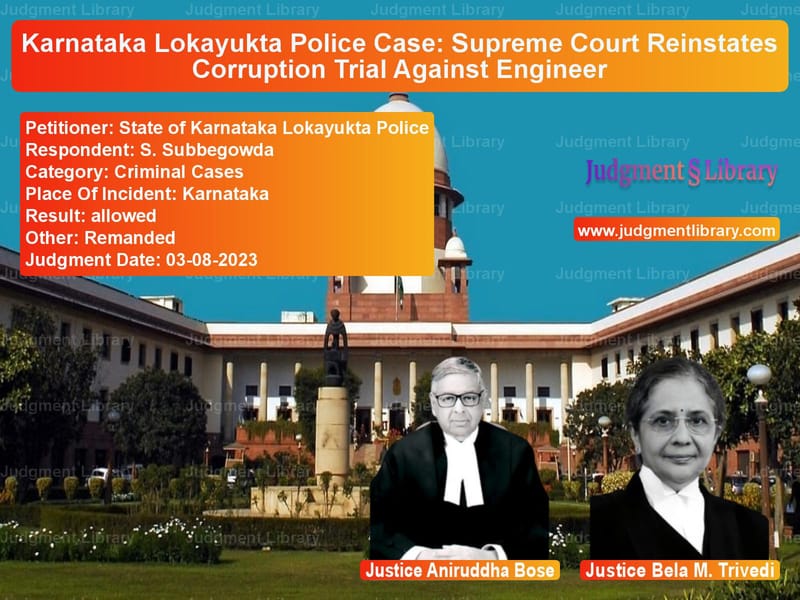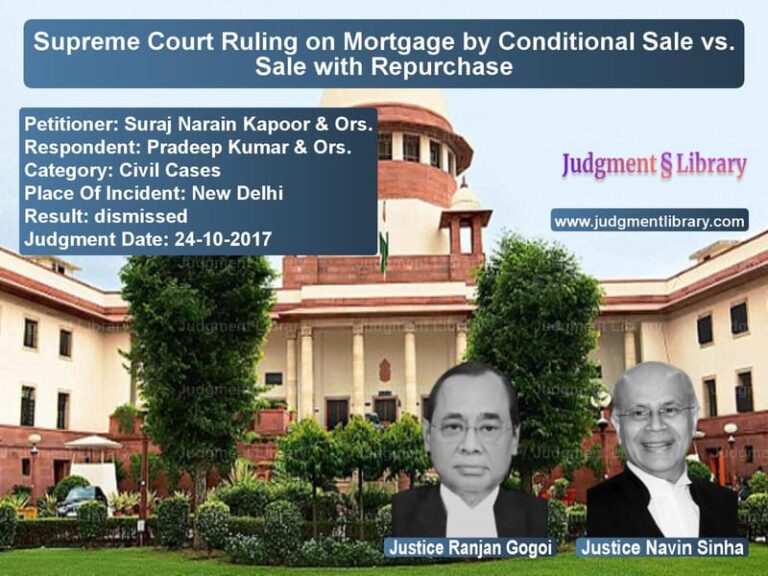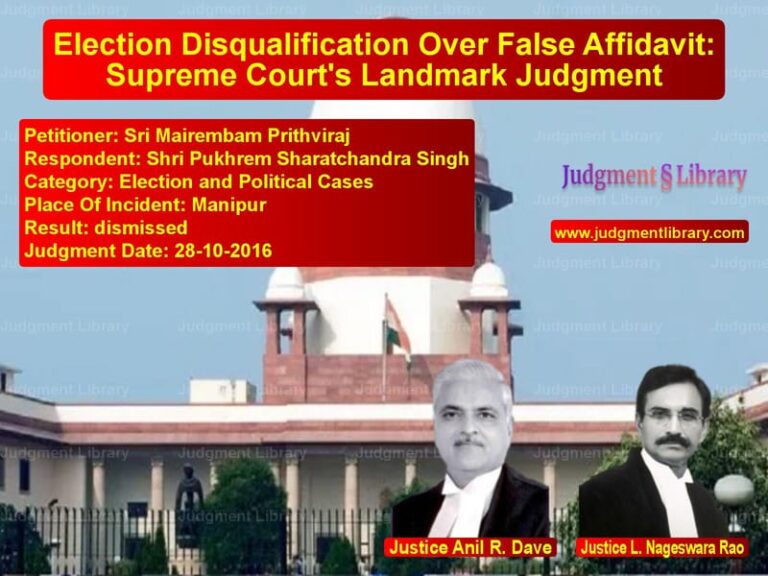Karnataka Lokayukta Police Case: Supreme Court Reinstates Corruption Trial Against Engineer
The Supreme Court of India recently ruled in the case of State of Karnataka Lokayukta Police vs. S. Subbegowda, reversing the High Court’s order that discharged a public servant from corruption charges. The case concerns an Executive Engineer accused of amassing wealth disproportionate to his known sources of income. The apex court emphasized that the validity of sanction for prosecution should have been raised at the trial stage and that the High Court had overstepped its authority in setting aside the charges.
Background of the Case
The case involves the respondent, S. Subbegowda, who was an Executive Engineer in the Karnataka Urban Water Supply and Drainage Board from 1983 to 2007. A source report submitted by the Deputy Superintendent of Police, Karnataka Lokayukta, alleged that the respondent had accumulated assets beyond his legal earnings.
Read also: https://judgmentlibrary.com/supreme-court-quashes-criminal-proceedings-in-workplace-dispute/
On December 17, 2007, a case was registered under Sections 13(1)(e) and 13(2) of the Prevention of Corruption Act, 1988 (PC Act). The Karnataka Government granted sanction for prosecution, and a chargesheet was filed in 2011.
Legal Proceedings
- 2007: Lokayukta police initiated an investigation based on a source report.
- 2010: Karnataka Government granted sanction for prosecution.
- 2011: Chargesheet filed, and the case was registered as Special Case No. 488/2011.
- 2011: Respondent filed a discharge petition under Section 227 and 239 of the Code of Criminal Procedure (CrPC), challenging the sanction order.
- 2013: High Court directed the trial court to reconsider the evidence but did not quash the case.
- 2014: Respondent withdrew the discharge petition and allowed charges to be framed.
- 2018: After 17 witnesses were examined, the respondent again filed for discharge, arguing that the sanction order was invalid.
- 2018: The High Court allowed the discharge petition, stating that the Karnataka Government had no jurisdiction to grant sanction.
- 2023: Supreme Court reversed the High Court’s ruling and reinstated the trial.
Arguments by the Petitioner (Karnataka Lokayukta Police)
The prosecution contended:
- The respondent had voluntarily allowed the trial to proceed and withdrew an earlier discharge petition.
- The sanction order was granted by a competent authority, and procedural lapses, if any, do not invalidate the proceedings.
- The High Court exceeded its jurisdiction by quashing the trial when 17 witnesses had already been examined.
- Under Section 19(3) of the PC Act, a trial cannot be invalidated solely due to minor irregularities in the sanction order unless a failure of justice is demonstrated.
Arguments by the Respondent (S. Subbegowda)
The respondent’s defense argued:
- The Karnataka Government lacked the authority to grant sanction as the respondent was an employee of the Karnataka Urban Water Supply and Drainage Board, which had its own appointing authority.
- The sanction order was granted without application of mind.
- The trial court should have discharged the accused earlier based on these procedural lapses.
Key Observations by the Supreme Court
The Supreme Court made several crucial observations:
1. The High Court Overstepped Its Authority
“The High Court in exercise of its powers under Section 482 of CrPC could not have discharged the respondent-accused when the trial had already progressed significantly.”
The Court held that the High Court had erred by interfering in an ongoing trial without clear proof of injustice.
2. Validity of Sanction Must Be Raised at Trial Stage
“The accused had the opportunity to challenge the sanction at the framing of charges but chose not to do so. Having allowed the trial to proceed, he cannot now seek discharge based on the same ground.”
The Court ruled that objections to the sanction order should have been raised at the appropriate procedural stage.
3. Section 19(3) of the PC Act Protects Against Procedural Lapses
“No finding, sentence, or order shall be reversed on the ground of any error, omission, or irregularity in the sanction unless it results in a failure of justice.”
The Court emphasized that minor errors in sanction do not invalidate an entire trial unless they cause substantive injustice.
4. Importance of Section 465 CrPC
“No judgment shall be reversed due to technical errors unless a failure of justice is demonstrated.”
The Court cited Section 465 of the CrPC, reinforcing that procedural technicalities should not be misused to derail trials.
Final Judgment
The Supreme Court ruled:
“The impugned order passed by the High Court is set aside. It will be open for the respondent to raise the issue of validity of sanction at the final stage of arguments in the trial.”
The trial court was directed to resume proceedings from where they had been halted.
Conclusion
The Supreme Court’s decision in State of Karnataka Lokayukta Police vs. S. Subbegowda reinforces the principle that corruption cases cannot be dismissed on mere procedural grounds. The ruling ensures that trials against public officials accused of financial misconduct proceed without unnecessary delays. This judgment sets a precedent that objections to sanction orders should be raised at the earliest stage and cannot be used as a defense tactic after the trial has significantly progressed.
Petitioner Name: State of Karnataka Lokayukta Police.Respondent Name: S. Subbegowda.Judgment By: Justice Aniruddha Bose, Justice Bela M. Trivedi.Place Of Incident: Karnataka.Judgment Date: 03-08-2023.
Don’t miss out on the full details! Download the complete judgment in PDF format below and gain valuable insights instantly!
Download Judgment: state-of-karnataka-l-vs-s.-subbegowda-supreme-court-of-india-judgment-dated-03-08-2023.pdf
Directly Download Judgment: Directly download this Judgment
See all petitions in Fraud and Forgery
See all petitions in Money Laundering Cases
See all petitions in Judgment by Aniruddha Bose
See all petitions in Judgment by Bela M. Trivedi
See all petitions in allowed
See all petitions in Remanded
See all petitions in supreme court of India judgments August 2023
See all petitions in 2023 judgments
See all posts in Criminal Cases Category
See all allowed petitions in Criminal Cases Category
See all Dismissed petitions in Criminal Cases Category
See all partially allowed petitions in Criminal Cases Category







